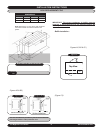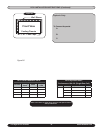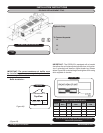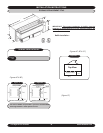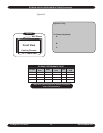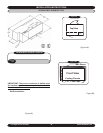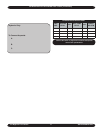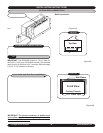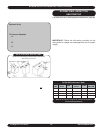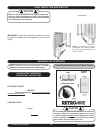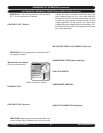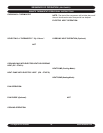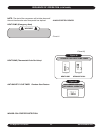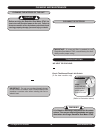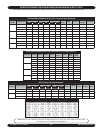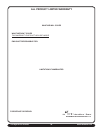
23
www.retroaire.com
The Right Fit For Comfort
HP HP
SEQUENCE OF OPERATION (CONTINUED)
condition be detected, the compressor and condenser fan
will be switched off for a minimum of three minutes and until
the freeze condition is satisfied. During this time the indoor
fan will continue to run to aid in the defrost process.
AJ4004 CONTROL BOARD: There are two sets of jumper
pins on the control board that are factory set so there
should no need to set them later on in the field. The first
is a set of three pins labeled “HP” for selection of either a
“Straight Cool” or “Heat Pump” unit. For “Straight Cool” the
center pin and outer most pin (usually on the top) are to be
jumped together. For Heat Pump units the center pin and
the pin closest to the relay are to be jumped together (see
Firure #1).
The second is a set of two pins labeled “TEST”. When these
two pins are jumped together, all timers are eliminated (i.e.
anti-short, purge, ect.). This is mainly used for production
line testing however it may also be useful for field-testing
as well. The units are shipped with the “TEST” jumper on
only one of the pins. Please, do not leave a unit with the
test jumper in the test mode (see Firure #2).
HEAT PUMP STRAIGHT COOL
STRAIGHT COOL/HEAT PUMP JUMER
Figure #1
TEST JUMPER POSITION
FOR NORMAL OPERATION
Figure #2
The LED Blink codes are as listed in below.
1 Blink Normal Operation
2 Blinks Compressor Lockout (ASCT)
3 Blinks Outdoor freeze condition
4 Blinks Indoor freeze condition
5 Blinks Simultaneous W & Y Call
Important sensor resistances are as follows.
77 °F - 10K ohms
50 °F - 19.9K ohms
35 °F - 30K ohms
30 °F - 34.4K ohms
! !
temperature below the room temperature. The heating
mode will cease and the indoor fan will remain on for an
additional sixty seconds.
NOTE: The start of the compressor will not take place until
the anti-short/random start time period has elapsed.
HEAT PUMP
(Emergency Heat)
WARNING
Before accessing the control compartment, disconnect
power to the unit. Failure to do so could result in
serious injury or electrical shock.
Should the heat pump system fail, it is possible to force the
control board into electric heat mode. This is a temporary
solution until the heat pump system can be repaired.
Locate the circuit board in the control section of the unit.
Locate the terminals where the outdoor sensor connects
to the circuit board. Using a small needle nose type pliers,
disconnect one side of the sensor from the circuit board.
This will appear to the circuit board as an outdoor coil freeze
condition there-by energizing the electric resistance heater
on the call for heat.
HEAT PUMP (Thermostatic Drain Pan Valve
): Heat pump
units are equipped with a thermostatic drain valve that will
open when outdoor temperatures fall below 50°F. This
keeps the base pan free of condensate water where it may
otherwise freeze during colder outdoor temperatures. As
part of its normal operation, the unit will produce condensate
and collect it in the base pan of the unit. There it will be
picked up by the condenser fan slinger ring and deposited
onto the condenser coil. During the cooling season, this
improves the unit’s efficiency by maintaining adequate
refrigeration system pressures.
ANTI-SHORT CYCLE TIMER – Random Start Feature:
This feature will prevent compressor short cycling and also
prevent multiple units in a single facility from simultaneously
starting following a power outage. This delay on break
feature ensures that the compressor remains off, between
cycles, until the three-minute time delay period has elapsed
allowing system pressures to equalize before re-starting.
The random start feature, initiated after a power failure,
will add a random time delay (between 5-120 seconds) to
the three-minute anti short cycle time following a power
outage. This will stagger the starting of multiple units in a
single facility allowing a building to slowly go back on line
when power is restored.
INDOOR COIL FREEZE PROTECTION: This feature will
prevent the indoor coil from freeze up in the cooling mode.
Indoor coil freeze up can occur due to a dirty air filter, low
refrigerant charge or low room or outdoor temperatures.
This in turn can cause compressor damage. Should a freeze



